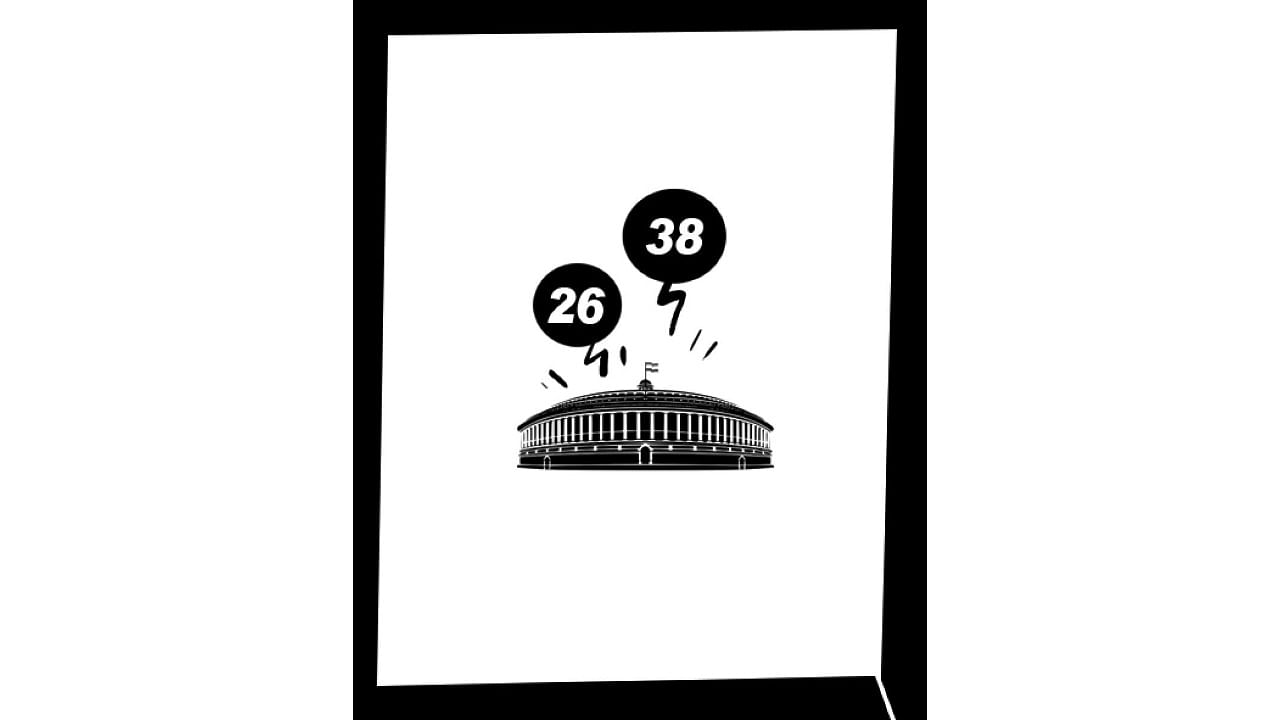
With the monsoon session starting this week, the 17th Lok Sabha will enter the home stretch, so to speak, with just two more sessions, the winter and budget sessions, remaining in its term and that of the current government. Entering the last cycle of the calendar before general elections should cause political parties on either side of the aisle to sharpen focus.
While the BJP-led NDA government of Prime Minister Narendra Modi would like to fast forward legislative action and push its agenda toward completion, the combined Opposition will attempt to corner the executive and enforce greater accountability in these sessions.
Ahead of the upcoming session, the battle lines were drawn with the ruling BJP flaunting 37 parties on its side at the NDA meet in Delhi, many of them gathered to it in just the last few days, while the Opposition platform boasted of 26 parties in it at its Bengaluru meet. The strength of these formations could wax or wane, depending on the ground conditions in the run-up to the general elections. Political parties will get a heads-up of which way the winds are blowing when the states of Chhattisgarh, Madhya Pradesh and Rajasthan vote for new governments, towards the year-end. In these states, it is essentially a direct contest between the two national parties, the BJP and the Congress.
A glimpse of what could play out will be available during the 17 scheduled sittings of the July 20 to August 11 monsoon session, which would be held in the old Parliament Building. Though inaugurated, the new Parliament House is not yet complete and ready to hold regular sessions.
The government listed its priorities and plans to introduce 21 new bills in parliament for consideration and passage. These include the controversial Personal Data Protection Bill, the Jan Vishwas Bill to reduce penal provisions in some cases, the Multi-State Cooperatives Bill, and a bill to back the setting up of the National Research Foundation.
However, the Opposition is still waiting to see whether the government frontloads a bill on the Uniform Civil Code (UCC). A recent observation by PM Modi on the need for a UCC in the country has led to speculation over it. The UCC is the third and last of the three must-do points on the BJP agenda. Of the three, two issues, Ram temple and the abrogation of Article 370 have been accomplished. Only the UCC remains and the clock to complete it before the 2024 Lok Sabha polls is ticking away. For the present, the
BJP has managed to bring it to the forefront and triggered a debate on it among
the people.
Indications from the BJP camp suggest that formal legislative action on the UCC may not happen in this session. The calculation is based on the decision of the Law Commission to extend the deadline for inviting public opinion on the UCC till July 28. The commission would then have just two more weeks to come out with a final report before the monsoon session is adjourned.
Many Opposition leaders have questioned the need for a UCC at this juncture, but in the absence of any document on what is being proposed, parties have refrained from taking a formal stand. The parliamentary action that has occurred so far on the issue was the July 3 meeting of a Standing Committee that heard the views of the Department of Legal Affairs, Legislative Department, and the Law Commission.
Meanwhile, one proposed legislation that has resulted in consolidation of forces on either side is the bill to replace the ordinance on Delhi Government, which was promulgated to overcome the Supreme Court verdict. The ordinance gave the Delhi Lieutenant Governor powers over civil servants posted in the city-state government. Since then, the Aam Aadmi Party government has been in a state of constant verbal duel with the L-G, which worsened during the recent Delhi floods.
Chief Minister Arvind Kejriwal launched a mission to garner support in parliament to vote against the ordinance. The Opposition can thank the BJP for bringing together different parties on this issue, with even the Congress deciding to support AAP. The party overrode vehement objections from its state units in Delhi and Punjab on the issue.
At the Patna conclave of opposition parties, AAP’s insistence that the meeting first take a call on the ordinance led to some plain-talking. AAP was an outlier at Patna but now with everyone on the same page, Kejriwal joined the Bengaluru conclave.
The Congress-led Opposition, under its president Mallikarjun Kharge, maintains a healthy equation with leaders of political parties in the Opposition. In the past few sessions, these leaders, whose parties have different priorities, have displayed greater cohesion on many issues.
There is a realisation that it is in the interest of the combined Opposition to let the Houses function without any turbulence. The opportunity to put the government on the mat and hold it accountable is best utilised during Question Hour and during debates on issues agitating the people.
While the ruling party blames the Opposition for creating disturbance in proceedings, leading to disorder in the Houses, during the last session, Opposition members insisted that allies of the BJP were responsible for stalling parliament. They accused the government of shying away from any meaningful discussion, especially on contentious matters.
The rise in prices of essential commodities, unemployment, floods in different parts of the country, the situation in Manipur, etc., are among the issues the Opposition has identified for debate, as also the long-pending and recurrent demand to know from the government the situation on the border with China.
There are devices in parliament through which the Opposition could raise these issues. It requires greater imagination and dexterity as vocal protests inside parliament that lead to the Houses being adjourned without transacting any business does not have the same effect as a well-rounded debate.
(The writer is a senior journalist based in New Delhi)